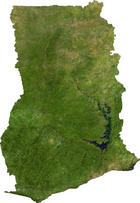
A | B | C | D | E | F | G | H | CH | I | J | K | L | M | N | O | P | Q | R | S | T | U | V | W | X | Y | Z | 0 | 1 | 2 | 3 | 4 | 5 | 6 | 7 | 8 | 9
Republic of Ghana | |
|---|---|
| Motto: "Freedom and Justice" | |
| Anthem: "God Bless Our Homeland Ghana" | |
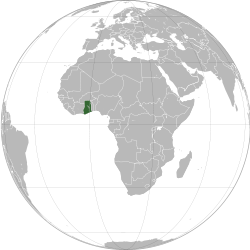 | |
| Capital and largest city | Accra 05°33′18″N 00°11′33″W / 5.55500°N 0.19250°W |
| Official languages | English[1][2] |
| Ethnic groups (2021 census[3]) |
|
| Religion (2021 census[3]) |
|
| Demonym(s) | Ghanaian |
| Government | Unitary presidential republic |
| Nana Akufo-Addo | |
| Mahamudu Bawumia | |
| Alban Bagbin | |
| Gertrude Tokornoo | |
| Legislature | Parliament |
| Independence from the United Kingdom | |
| 6 March 1957 | |
• Republic | 1 July 1960 |
| Area | |
• Total | 239,567[4] km2 (92,497 sq mi) (80th) |
• Water (%) | 4.61 (11,000 km2; 4,247 mi2) |
| Population | |
• 2024 estimate | 34,589,092[5] (48th) |
• Density | 101.5/km2 (262.9/sq mi) (66th) |
| GDP (PPP) | 2023 estimate |
• Total | |
• Per capita | |
| GDP (nominal) | 2023 estimate |
• Total | |
• Per capita | |
| Gini (2024) | medium |
| HDI (2022) | medium (145th) |
| Currency | Cedi (GHS) |
| Time zone | UTC (GMT) |
| Date format | dd/mm/yyyy |
| Driving side | right |
| Calling code | +233 |
| ISO 3166 code | GH |
| Internet TLD | .gh |
Ghana,[a] officially the Republic of Ghana, is a country in West Africa. It abuts the Gulf of Guinea and the Atlantic Ocean to the south, sharing a border with Ivory Coast in the west, Burkina Faso in the north, and Togo in the east. Ghana covers an area of 239,567 km2 (92,497 sq mi), spanning diverse biomes that range from coastal savannas to tropical rainforests. With nearly 35 million inhabitants, Ghana is the second-most populous country in West Africa. The capital and largest city is Accra; other significant cities include Kumasi, Tamale, and Sekondi-Takoradi.
The earliest kingdoms to emerge in Ghana were the Kingdom of Dagbon in the north and the Bono state in the south, with the Bono state existing in the area during the 11th century.[9][10] The Ashanti Empire and other Akan kingdoms in the south emerged over the centuries.[11] Beginning in the 15th century, the Portuguese Empire, followed by other European powers, contested the area for trading rights, until the British ultimately established control of the coast by the 19th century. Following over a century of colonial resistance, the current borders of the country took shape, encompassing four separate British colonial territories: Gold Coast, Ashanti, the Northern Territories, and British Togoland. These were unified as an independent dominion within the Commonwealth of Nations. On 6 March 1957, Ghana became the first colony in Sub-Saharan Africa to achieve sovereignty.[12][13][14] Ghana subsequently became influential in decolonisation efforts and the Pan-African movement.[15]
Ghana is a multi-ethnic country with linguistic and religious groups;[16] while the Akan are the largest ethnic group, they constitute a plurality. Most Ghanaians are Christians (71.3%); almost a fifth are Muslims; a tenth practise traditional faiths or report no religion.[3] Ghana is a unitary constitutional democracy led by a president who is head of state and head of government.[17] For political stability in Africa, Ghana ranked seventh in the 2012 Ibrahim Index of African Governance and fifth in the 2012 Fragile States Index. It has maintained since 1993 one of the freest and most stable governments on the continent, and it performs relatively well in healthcare, economic growth, and human development,[15][18] so that it has a significant influence in West Africa and Africa as a whole.[19] Ghana is highly integrated in international affairs, being a founding member of the Non-Aligned Movement, African Union and a member of the Economic Community of West African States, Group of 24 and Commonwealth of Nations.[20]
History
Mediaeval kingdoms

The earliest recorded kingdoms to emerge in modern Ghana were the Mole-Dagbon states.[21] Before the unification of Dagbon, societies were decentralised, and headed by the Tindaamba (singular: tindana).[22] These decentralised states were unified by King Gbewaa, who lived a long life, and formed a stable, peaceful society.[23] Dagbon extended beyond the boundaries of present-day Ghana.[24][25][26] Kingdoms that emerged from Dagbon include the Mossi Kingdoms of Burkina Faso,[27] and Bouna Kingdom of Ivory Coast.[28] The kingdom enjoyed great prosperity establishing Ghana's earliest educational systems,[29] and using a writing script[30][31] prior to European invasion. Female chiefs who rule over male subjects are present in the kingdom,[32] and inheritance is both patrilineal and matrilineal.[33] The Yaa Naa is the King of Dagbon and the Gundo Naa is the Queen.[34][35] The kingdom remained uncolonised. In 1896, Germany invaded Eastern Dagbon (Naya) and burnt down its capital, Yendi,[36][37] during the Battle of Adibo.[38][39]

The Akan-speaking peoples began to move into what later became Ghana toward the 15th century.[21][40] By the 16th century, the Akans were established in the Akan state called Bonoman, for which the Brong-Ahafo region was named.[21][41] From the 17th century, Akans emerged from what is believed to have been the Bonoman area, to create Akan states, mainly based on gold trading.[42] These states included Bonoman (Brong-Ahafo region), Ashanti (Ashanti Region), Denkyira (Western North region), Mankessim Kingdom (Central region), and Akwamu (Eastern region).[21] By the 19th century, the territory of the southern part of Ghana was included in the Kingdom of Ashanti.[21] The government of the Ashanti Empire operated first as a loose network and eventually as a centralised kingdom with a specialised bureaucracy centred in the capital city of Kumasi.[21] Prior to Akan contact with Europeans, the Akan people created an economy based on principally gold and gold bar commodities, which were traded with other states in Africa.[21][43]
The Ga-Dangme and Ewe migrated westward from south-western Nigeria. The Ewe - formerly known as Dogbo- migrated from Oyo area with their Gbe-speaking kinsmen (Adja, Fon, Phla/Phera and Ogun/Gun) and in transition, settled at Ketou in Benin Republic, Tado in Togo, Dogbo Nyigbo in Benin Republic and with Nortsie (a walled town in present-day Togo) as their final dispersal point. Their dispersal from Nortsie was necessitated by the high-handed rule of King Agorkorli (Agɔ Akɔli) who was the reigning monarch of the tribe at that time. The Ewe in Ghana speak three principal dialects: Anlo(along the coast),Tongu(along the Volta river) and Ewedome (in the hill country side).The Ga-Dangme occupy the Greater Accra Region and parts of the Eastern Region, while the Ewe are found in the Volta Region as well as the neighbouring Togo, Benin Republic and Nigeria (around Badagry area).
European contact and colonialism
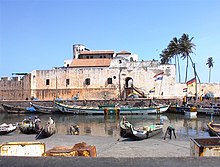
Akan trade with European states began after contact with the Portuguese in the 15th century.[44] European contact was by the Portuguese people, who came to the Gold Coast region in the 15th century to trade. The Portuguese then established the Portuguese Gold Coast (Costa do Ouro), focused on the availability of gold.[45] The Portuguese built a trading lodge at a coastal settlement called Anomansah (the perpetual drink) which they renamed São Jorge da Mina.[45] In 1481, King John II of Portugal commissioned Diogo de Azambuja to build the Elmina Castle, which was completed in 3 years.[45] By 1598, the Dutch had joined the Portuguese in the gold trade, establishing the Dutch Gold Coast (Nederlandse Bezittingen ter Kuste van Guinea - 'Dutch properties at the Guinea coast') and building forts at Fort Komenda and Kormantsi.[46] In 1617, the Dutch captured the Elmina Castle from the Portuguese and Axim in 1642 (Fort St Anthony).[46]
European traders had joined in gold trading by the 17th century, including the Swedes, establishing the Swedish Gold Coast (Svenska Guldkusten), and Denmark–Norway, establishing the Danish Gold Coast (Danske Guldkyst or Dansk Guinea).[47] European traders participated in the Atlantic slave trade in this area.[48] More than 30 forts and castles were built by the merchants. The Germans established the Brandenburger Gold Coast or Groß Friedrichsburg.[49] In 1874, Great Britain established control over some parts of the country, assigning these areas the status of the British Gold Coast.[50] Military engagements occurred between British colonial powers and Akan nation-states. The Kingdom of Ashanti defeated the British some times in the 100-year-long Anglo-Ashanti wars and eventually lost with the War of the Golden Stool in 1900.[51][52][53]
Transition to independence
In 1947, the newly formed United Gold Coast Convention led by "The Big Six" called for "self-government within the shortest possible time" following the 1946 Gold Coast legislative election.[47][54] Kwame Nkrumah, a Ghanaian nationalist who led Ghana from 1957 to 1966 as the country's first prime minister and president, formed the Convention People's Party in 1949 with the motto "self-government now".[47] The party initiated a "positive action" campaign involving non-violent protests, strikes and non-cooperation with the British authorities. Nkrumah was arrested and sentenced to one year imprisonment during this time. In the Gold Coast's 1951 general election, he was elected to Parliament and was released from prison.[47] He became prime minister in 1952 and began a policy of Africanization.[citation needed]
On 6 March 1957 at midnight, the Gold Coast, Ashanti, the Northern Territories, and British Togoland were unified as one single independent dominion within the British Commonwealth under the name Ghana. This was done under the Ghana Independence Act 1957. The current flag of Ghana, consisting of the colours red, gold, green, and a black star, dates back to this unification.[55] On 1 July 1960, following the Ghanaian constitutional referendum and Ghanaian presidential election, Nkrumah declared Ghana a republic and assumed the presidency.[12][13][14][47] 6 March is the nation's Independence Day, and 1 July is celebrated as Republic Day.[56][57]
Nkrumah led an authoritarian regime in Ghana, as he repressed political opposition and conducted elections that were not free and fair.[58][59][60][61][62] In 1964, a constitutional amendment made Ghana a one-party state, with Nkrumah as president for life of both the nation and its party.[63] Nkrumah was the first African head of state to promote the concept of Pan-Africanism, which he had been introduced to during his studies at Lincoln University, Pennsylvania in the United States, at the time when Marcus Garvey was known for his "Back to Africa Movement".[47] He merged the teachings of Garvey, Martin Luther King Jr. and the naturalised Ghanaian scholar W. E. B. Du Bois into the formation of 1960s Ghana.[47] Osagyefo Dr. Kwame Nkrumah, as he became known, played an instrumental part in the founding of the Non-Aligned Movement, and in establishing the Kwame Nkrumah Ideological Institute to teach his ideologies of communism and socialism.[64] His life achievements were recognised by Ghanaians during his centenary birthday celebration, and the day was instituted as a public holiday in Ghana (Founders' Day).[65]
Operation Cold Chop and aftermath
The government of Nkrumah was subsequently overthrown in a coup by the Ghana Armed Forces, codenamed "Operation Cold Chop". This occurred while Nkrumah was abroad with Zhou Enlai in the People's Republic of China, on a fruitless mission to Hanoi, Vietnam, to help end the Vietnam War. The coup took place on 24 February 1966, led by Colonel Emmanuel Kwasi Kotoka and Brigadier Akwasi Afrifa. The National Liberation Council was formed, chaired by Lieutenant General Joseph A. Ankrah.[66][67]
A series of alternating military and civilian governments, often affected by economic instabilities,[68] ruled Ghana from 1966, ending with the ascent to power of Flight Lieutenant Jerry John Rawlings of the Provisional National Defence Council in 1981.[69] These changes resulted in the suspension of the constitution in 1981 and the banning of political parties.[70] The economy soon declined, so Rawlings negotiated a structural adjustment plan, changing many old economic policies, and growth recovered during the mid-1980s.[70] A new constitution restoring multi-party system politics was promulgated in the presidential election of 1992, in which Rawlings was elected, and again in the general election of 1996.[71]
In a tribal war in Northern Ghana in 1994, between the Konkomba and other ethnic groups, including the Nanumba, Dagomba and Gonja, between 1,000 and 2,000 people were killed and 150,000 people were displaced.[72]

After the 2000 general election, John Kufuor of the New Patriotic Party became president of Ghana on 7 January 2001 and was re-elected in 2004, thus also serving two terms (the term limit) as president of Ghana and marking the first time under the fourth republic that power was transferred from one legitimately elected head of state and head of government to another.[71]
Nana Akufo-Addo, the ruling party candidate, was defeated in a very close 2008 general election by John Atta Mills of the National Democratic Congress.[73][74] Mills died of natural causes and was succeeded by Vice President John Mahama on 24 July 2012.[75] Following the 2012 general election, Mahama became president in his own right,[76] and Ghana was described as a "stable democracy".[77][78] As a result of the 2016 general election,[79] Nana Akufo-Addo became president on 7 January 2017.[80] He was re-elected after a tightly contested election in 2020.[81]
To combat deforestation, on 11 June 2021 Ghana inaugurated Green Ghana Day, with the aim of planting five million trees in a concentrated effort to preserve the country's rainforest cover.[82]
Geography
Ghana is located on the Gulf of Guinea, a few degrees north of the Equator.[83] It spans an area of 239,535 km2 (92,485 sq mi)[84] and has an Atlantic coastline that stretches 560 kilometres (350 miles) on the Gulf of Guinea in the Atlantic Ocean to its south.[83] Dodi Island and Bobowasi Island are near the south coast.[85] It lies between latitudes 4°45'N and 11°N, and longitudes 1°15'E and 3°15'W. The prime meridian passes through Ghana, specifically through Tema.[83] Ghana is geographically closer to the intersection of the Prime Meridian and the Equator than any other country, since this point, (0°, 0°), is located in the Atlantic Ocean approximately 614 km (382 mi) off the south-east coast of Ghana.
Grasslands mixed with south coastal shrublands and forests dominate Ghana, with forest extending northward from the coast 320 kilometres (200 miles) and eastward for a maximum of about 270 kilometres (170 miles) with locations for mining of industrial minerals and timber.[83] Ghana is home to 5 terrestrial ecoregions: Eastern Guinean forests, Guinean forest–savanna mosaic, West Sudanian savanna, Central African mangroves, and Guinean mangroves.[86] It had a 2018 Forest Landscape Integrity Index mean score of 4.53/10, ranking it 112th globally out of 172 countries.[87]
The White Volta River and its tributary Black Volta, flow south through Ghana to Lake Volta, the world's third-largest reservoir by volume and largest by surface area, formed by the hydroelectric Akosombo Dam,[88] completed in 1965.[89] The Volta flows out of Lake Volta into the Gulf of Guinea.[90] The northernmost part of Ghana is Pulmakong and the southernmost part of Ghana is Cape Three Points.[83]
The climate of Ghana is tropical, and there is wet season and dry season.[92] Ghana sits at the intersection of 3 hydro-climatic zones.[93] Changes in rainfall, weather conditions and sea-level rise affect the salinity of coastal waters. This is expected to negatively affect both farming and fisheries.[94]
In 2015, the government produced a document titled "Ghana's Intended Nationally Determined Contribution."[95] Following that, Ghana signed the Paris Climate Agreement in 2016.
Politics

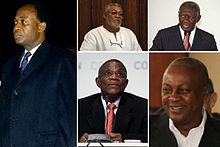
Ghana is a unitary presidential constitutional democracy with a parliamentary multi-party system that is dominated by two parties—the National Democratic Congress (NDC) and the New Patriotic Party (NPP). Ghana alternated between civilian and military governments until January 1993, when the military government gave way to the Fourth Republic of Ghana after presidential and parliamentary elections in late 1992. The 1992 constitution of Ghana divides powers among a commander-in-chief of the Ghana Armed Forces (President of Ghana), parliament (Parliament of Ghana), cabinet (Cabinet of Ghana), council of state (Ghanaian Council of State), and an independent judiciary (Judiciary of Ghana). The government is elected by universal suffrage after every four years.[96]
Nana Akufo-Addo won the presidency in the general election in 2016, defeating incumbent John Mahama. He also won the 2020 election after the presidential election results were challenged at the Supreme Court by flagbearer of the NDC, John Mahama. Presidents are limited to two four-year terms in office. The president can serve a second term only upon re-election.
The 2012 Fragile States Index indicated that Ghana is ranked the 67th-least fragile state in the world and the fifth-least fragile state in Africa. Ghana ranked 112th out of 177 countries on the index.[97] Ghana ranked as the 64th-least corrupt and politically corrupt country in the world out of all 174 countries ranked and ranked as the fifth-least corrupt and politically corrupt country in Africa out of 53 countries in the 2012 Transparency International Corruption Perception Index.[98][99] Ghana was ranked seventh in Africa out of 53 countries in the 2012 Ibrahim Index of African Governance. The Ibrahim Index is a comprehensive measure of African government, based on variables which reflect the success with which governments deliver essential political goods to its citizens.[100] According to 2023 V-Dem Democracy indices Ghana is ranked 67th electoral democracy worldwide and 10th electoral democracy in Africa.[101]
Foreign relations
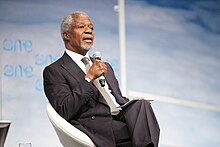
Since independence, Ghana has been devoted to ideals of nonalignment and is a founding member of the Non-Aligned Movement. Ghana favours international and regional political and economic co-operation, and is an active member of the United Nations and the African Union.[102]
Ghana has a strong relationship with the United States. Three recent U.S. presidents—Bill Clinton, George W. Bush, and Barack Obama—and a Vice President—Kamala Harris—have made diplomatic trips to Ghana.[103] Many Ghanaian diplomats and politicians hold positions in international organisations, including Ghanaian diplomat and former Secretary-General of the United Nations Kofi Annan, International Criminal Court Judge Akua Kuenyehia, as well as former President Jerry John Rawlings and former President John Agyekum Kufuor, who both served as diplomats of the United Nations.[96]
In September 2010, President John Atta Mills visited China on an official visit. Mills and China's former President Hu Jintao marked the 50th anniversary of diplomatic ties between the two nations, at the Great Hall of the People.[104] China reciprocated with an official visit in November 2011, by the vice-chairman of the Standing Committee of the National People's Congress of China, Zhou Tienong who visited Ghana and met with Ghana's President John Mahama.[105] Iranian President Mahmoud Ahmadinejad met with Mahama in 2013 to hold discussions on strengthening the Non-Aligned Movement and also co–chair a bilateral meeting between Ghana and Iran at the Ghanaian presidential palace Flagstaff House.[106][107][108][109][110]
The Sustainable Development Goals (SDG) were integrated into Ghana's development agenda and the budget. According to reports, the SDGs were implemented through a decentralized planning approach. This allows for stakeholders' participation, such as in UN agencies, traditional leaders, civil society organizations, academia, and others.[111] The 17 SDGs are a global call to action to end poverty among others, and the UN and its partners in the country are working towards achieving them.[112] According to the President Nana Akufo-Addo, Ghana was "the first sub-Saharan African country to achieve the goal of halving poverty, as contained in Goal 1 of the Millennium Development Goals".[113]
Military

In 1957, the Ghana Armed Forces (GAF) consisted of its headquarters, support services, three battalions of infantry and a reconnaissance squadron with armoured vehicles.[114] President Nkrumah aimed at rapidly expanding the GAF to support the United States of Africa ambitions. Thus, in 1961, 4th and 5th Battalions were established, and in 1964 6th Battalion was established, from a parachute airborne unit originally raised in 1963.[115] Today, Ghana is a regional power and regional hegemon.[19] In his book Shake Hands with the Devil, Canadian Forces commander Roméo Dallaire highly rated the GAF soldiers and military personnel.[114]
The military operations and military doctrine of the GAF are conceptualised in the constitution, Ghana's Law on Armed Force Military Strategy, and Kofi Annan International Peacekeeping Training Centre agreements to which GAF is attestator.[116][117][118] GAF military operations are executed under the auspices and imperium of the Ministry of Defence.[116][119] Although Ghana is relatively peaceful and is often considered being one of the least violent countries in the region, Ghana has experienced political violence in the past and 2017 has thus far seen an upward trend in incidents motivated by political grievances.[120]
Law enforcement

The Ghana Police Service and the Criminal Investigation Department are the main law enforcement agencies, responsible for the detection of crime, maintenance of law and order and the maintenance of internal peace and security.[121] The Ghana Police Service has eleven specialised police units, including a Militarized police Rapid deployment force and Marine Police Unit.[122][123] The Ghana Police Service operates in 12 divisions: ten covering the regions of Ghana, one assigned specifically to the seaport and industrial hub of Tema, and the twelfth being the Railways, Ports and Harbours Division.[123] The Ghana Police Service's Marine Police Unit and Division handles issues that arise from the country's offshore oil and gas industry.[123]
The Ghana Prisons Service and the sub-division Borstal Institute for Juveniles administers incarceration.[124] Ghana retains and exercises the death penalty for treason, corruption, robbery, piracy, drug trafficking, rape, and homicide.[125][126] The new sustainable development goals adopted by the United Nations call for the international community to come together to promote the rule of law; support equal access to justice for all; reduce corruption; and develop effective, accountable, and transparent institutions at all levels.[127]
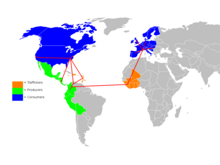
Ghana is used as a key narcotics industry transshipment point by traffickers, usually from South America as well as some from other African nations.[128] In 2013, the UN chief of the Office on Drugs and Crime stated that "West Africa is completely weak in terms of border control and the big drug cartels from Colombia and Latin America have chosen Africa as a way to reach Europe."[129] There is not a wide or popular knowledge about the narcotics industry and intercepted narcotics within Ghana, since it is an underground economy. The social context within which narcotic trafficking, storage, transportation, and repacking systems exist in Ghana and the state's location along the Gulf of Guinea makes Ghana an attractive country for the narcotics business.[128][130] The Narcotics Control Board has impounded container ships at the Sekondi Naval Base in the Takoradi Harbour. These ships were carrying thousands of kilograms of cocaine, with a street value running into billions of Ghana cedis. However, drug seizures saw a decline in 2011.[128][130] Drug cartels are using new methods in narcotics production and narcotics exportation, to avoid Ghanaian security agencies.[128][130] Underdeveloped institutions, porous open borders, and the existence of established smuggling organisations contribute to Ghana's position in the narcotics industry.[128][130] President Mills initiated ongoing efforts to reduce the role of airports in Ghana's drug trade.[128]
Human rights
Homosexual acts are prohibited by law in Ghana.[131] According to a 2013 survey by the Pew Research Center, 96% of Ghanaians believe that homosexuality should not be accepted by society.[132] Sometimes elderly women in Ghana are accused of witchcraft, particularly in rural Ghana. Issues of witchcraft mainly remain as speculations based on superstitions within families. In some parts of northern Ghana, there exist what are called witch camps. These are said to house a total of around 1,000 people accused of witchcraft.[133] The Ghanaian government has announced that it intends to close the camps.[133]
Economy
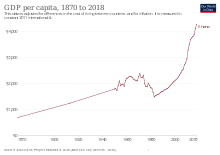


Ghana possesses industrial minerals, hydrocarbons and precious metals. It is an emerging designated digital economy with mixed economy hybridisation and an emerging market. It has an economic plan target known as the "Ghana Vision 2020". This plan envisions Ghana as the first African country to become a developed country between 2020 and 2029 and a newly industrialised country between 2030 and 2039.[134] This excludes fellow Group of 24 member and Sub-Saharan African country South Africa, which is a newly industrialised country.[135]
Ghana's economy has ties to the Chinese yuan renminbi along with Ghana's vast gold reserves. In 2013, the Bank of Ghana began circulating the renminbi throughout Ghanaian state-owned banks and to the Ghana public as hard currency along with the national Ghanaian cedi for second national trade currency.[136]
Between 2012 and 2013, 38% of rural dwellers were experiencing poverty whereas only 11% of urban dwellers were.[137] Urban areas hold greater opportunity for employment, particularly in informal trade, while nearly all (94 percent) of "rural poor households" participate in the agricultural sector.[138]
The Volta River Authority and the Ghana National Petroleum Corporation, both state-owned, are the two major electricity producers.[139] The Akosombo Dam, built on the Volta River in 1965, along with the Bui Dam, the Kpong Dam and several other hydroelectric dams, provide hydropower.[140][141] In addition, the government sought to build the second nuclear power plant in Africa.
The Ghana Stock Exchange is the fifth largest on continental Africa and 3rd largest in sub-saharan Africa with a market capitalisation of GH¢ 57.2 billion or CN¥180.4 billion in 2012 with the South Africa JSE Limited as first.[142] The Ghana Stock Exchange was the second best performing stock exchange in sub-saharan Africa in 2013.[143]
Ghana produces high-quality cocoa.[144] It is the second largest producer of cocoa globally.[145] Ghana is classified as a middle income country.[6][146] Services account for 50% of GDP, followed by manufacturing (24.1%), extractive industries (5%), and taxes (20.9%).[139] Ghana has an increasing primary manufacturing economy and export of digital technology goods along with assembling and exporting automobiles and ships, diverse resource rich exportation of industrial minerals, agricultural products primarily cocoa, petroleum and natural gas,[147] and industries such as information and communications technology primarily via Ghana's state digital technology corporation Rlg Communications which manufactures tablet computers with smartphones and various consumer electronics.[139][148] Urban electric cars have been manufactured in Ghana since 2014.[149][150]
It announced plans to issue government debt by way of social and green bonds in Autumn 2021, making it the first African country to do so.[151][152] The country, which was planning to borrow up to $5 billion in international markets,[when?] would use the proceeds from these sustainable bonds to refinance debt used for social and environmental projects and pay for educational or health. Only a few other nations have sold them so far, including Chile and Ecuador. The country will use the proceeds to forge ahead with a free secondary-school initiative started in 2017 among other programs, despite having recorded its lowest economic growth rate in 37 years in 2020.[153]

It produces and exports hydrocarbons such as sweet crude oil and natural gas.[154][155] The 100%-state-owned filling station company, Ghana Oil Company, is the number 1 petroleum and gas filling station, and the 100%-state-owned state oil company Ghana National Petroleum Corporation oversees hydrocarbon exploration and production of petroleum and natural gas reserves. Ghana aims to further increase the output of oil to 2.2 million barrels (350,000 m3) per day and gas to 34,000,000 cubic metres (1.2×109 cu ft) per day.[156] The Jubilee Oil Field, which contains up to 3 billion barrels (480,000,000 m3) of sweet crude oil, was discovered in 2007.[157] Ghana is believed to have up to 5 billion barrels (790,000,000 m3) to 7 billion barrels (1.1×109 m3) of petroleum in reserves,[158] which is the fifth-largest in Africa and the 21st-to-25th-largest proven reserves in the world. It also has up to 1.7×1011 cubic metres (6×1012 cu ft) of natural gas in reserves.[159] The government has drawn up plans to nationalise petroleum and natural gas reserves to increase government revenue.[160]
As of 2019, Ghana was the 7th largest producer of gold in the world, producing ~140 tonnes that year.[161] This record saw Ghana surpass South Africa in output for the first time, making Ghana the largest gold producer in Africa.[162] In addition to gold, Ghana exports silver, timber, diamonds, bauxite, and manganese, and has other mineral deposits.[163] Ghana ranks 9th in the world in diamond export and reserve size.[164] The government has drawn up plans to nationalize mining industry to increase government revenue.[165][166]
"Shortages" of electricity in 2015 and 2016 led to dumsor ("persistent, irregular and unpredictable" electric power outages),[167] increasing the interest in renewables.[168] As of 2019, there is a surplus of electricity.[169]
The judicial system of Ghana deals with corruption, economic malpractice and lack of economic transparency.[170] According to Transparency International's Corruption Perception Index of 2018, out of 180 countries, Ghana was ranked 78th, with a score of 41 on a scale where a 0–9 score means highly corrupt, and a 90–100 score means very clean. This was based on perceived levels of public sector corruption.[171]
Transport
The trans-African automobile route - the Dakar-Lagos Highway passes through Ghana.
There are several airports in Ghana.
Rail transport in Ghana have a gauge of 1067 mm (Cape gauge). Sea transportation is developed.
Science and technology
Ghana launched a cellular mobile network in 1992. It was later connected to the Internet and introduced ADSL broadband services.[172] It was ranked 99th in the Global Innovation Index in 2023.[173][174]
The Ghana Space Science and Technology Centre (GSSTC) and Ghana Space Agency (GhsA) oversee space exploration and space programmes. GSSTC and GhsA worked to have a national security observational satellite launched into orbit in 2015.[175][176] Ghana's annual space exploration expenditure has been 1% of its GDP, to support research in science and technology. In 2012, Ghana was elected to chair the Commission on Science and Technology for Sustainable Development in the South (Comsats); Ghana has a joint effort in space exploration with the South African National Space Agency.[175]
Tourism

In 2011, 1,087,000 tourists visited Ghana.[177] Tourist arrivals include South Americans, Asians, Europeans, and North Americans.[178] The attractions and tourist destinations include waterfalls such as Kintampo waterfalls and the largest waterfall in west Africa, Wli waterfalls, the coastal palm-lined sandy beaches, caves, mountains, rivers, and reservoirs and lakes such as Lake Bosumtwi and the largest human-made lake in the world by surface area, Lake Volta, dozens of forts and castles, World Heritage Sites, nature reserves and national parks.[178] Some castles are Cape Coast Castle and the Elmina Castle.[179] Castles mark where blood was shed in the slave trade and preserve and promote the African heritage stolen and destroyed through the slave trade.[180] As a result of this, the World Heritage Convention of UNESCO named Ghana's castles and forts as World Heritage Monuments.[180]
The World Economic Forum statistics in 2010 showed that out of the world's favourite tourist destinations, Ghana was ranked 108th out of 139 countries.[181] The country had moved two places up from the 2009 rankings. In 2011, Forbes magazine published that Ghana was ranked the eleventh most friendly country in the world. The assertion was based on a survey in 2010 of a cross-section of travellers. Of all the African countries that were included in the survey, Ghana ranked highest.[181] Tourism is the fourth highest earner of foreign exchange for the country.[181] In 2017, Ghana ranked as the 43rd–most peaceful country in the world.[182]
Up and down the coastline, surfing spots have been identified and cultivated by locals and internationals. Surfers have made trips to the country to sample the waves. Surfers carried their boards amid traditional fishing vessels.[183]
According to Destination Pride[184]—a data-driven search platform used to visualize the world's LGBTQ+ laws, rights and social sentiment—Ghana's Pride score is 22 (out of 100).[185]
Demographics
As of 2019, Ghana has a population of 30,083,000.[186] Around 29% of the population is under the age of 15, while persons aged 15–64 make up 57.8 percent of the population.[187] The 2010 census reported that the largest ethnic groups are the Akan (47.3%), the Mole-Dagbani (16.6%), the Ewe (13.9%), the Ga-Dangme (7.4%), the Gurma (5.7%) and the Guan (3.7%).[188]
The median age of Ghanaian citizens is 30 years old and the average household size is 3.6 persons.
With recent legal immigration of skilled workers who possess Ghana Cards, there is a small population of Chinese, Malaysian, Indian, Middle Eastern and European nationals. In 2010, the Ghana Immigration Service reported many economic migrants and Illegal immigrants inhabiting Ghana: 14.6% (or 3.1 million) of Ghana's 2010 population (predominantly Nigerians, Burkinabe citizens, Togolese citizens, and Malian citizens). In 1969, under the "Ghana Aliens Compliance Order" enacted by Prime Minister Kofi Abrefa Busia,[189] the Border Guard Unit deported over 3,000,000 aliens and illegal immigrants in three months as they made up 20% of the population at the time.[189][190][191] In 2013, there was a mass deportation of illegal miners; over 4,000 of which were Chinese nationals.[192][193]
Largest cities or towns in Ghana
2021 Ghana census | |||||||||
|---|---|---|---|---|---|---|---|---|---|
| Rank | Name | Region | Municipal pop. | ||||||
| 1 | Accra | Greater Accra | 1,964,264 | ||||||
| 2 | Kumasi | Ashanti Region | 1,468,609 | ||||||
| 3 | Tamale, Ghana | Northern Region (Ghana) | 360,579 | ||||||
| 4 | Takoradi | Western Region (Ghana) | 232,919 | ||||||
| 5 | Sunyani | Bono Region | 202,932 | ||||||
| 6 | Teshie | Greater Accra | 176,597 | ||||||
| 7 | Cape Coast | Central Region (Ghana) | 143,015 | ||||||
| 8 | Sekondi-Takoradi | Central Region (Ghana) | 138,872 | ||||||
| 9 | Obuasi | Ashanti Region | 137,856 | ||||||
| 10 | Koforidua | Eastern Region (Ghana) | 130,810 | ||||||
Languages

English is the official language of Ghana.[194][195] Additionally, there are eleven languages that have the status of government-sponsored languages:
- Akan languages (Asante Twi, Akuapem Twi, Fante which have a high degree of mutual intelligibility, and Nzema, which is less intelligible with the above)
- Dangme
- Ewe
- Ga
- Guan
- Kasem
- Mole-Dagbani languages (Dagaare and Dagbanli)[196][197]
Of these, Asante Twi is the most widely spoken.[198]
Because Ghana is surrounded by French-speaking countries, French is widely taught in schools and used for commercial and international economic exchanges. Since 2006, Ghana has been an associate member of the Organisation internationale de la Francophonie,[199] the global organisation that unites French-speaking countries (84 nations on six continents). In 2005, more than 350,000 Ghanaian children studied French in schools. Since then, its status has been progressively updated to a mandatory language in every junior high school,[200] and it is in the process of becoming an official language.[201][202]
Ghanaian Pidgin English, also known as Kru English (or in Akan, kroo brofo), is a variety of West African Pidgin English spoken in Accra and in the southern towns.[203] It can be divided into two varieties, referred to as "uneducated" or "non-institutionalized" pidgin and "educated" or "institutionalized" pidgin, the former associated with uneducated or illiterate people and the latter acquired and used in institutions such as universities.[204]
Religion
Christianity is the largest religion in Ghana, with 71.3% of the population being members of various Christian denominations as of the 2021 census.[205] Islam is practised by 20% of the total population. According to a 2012 report by Pew Research, 51% of Muslims are followers of Sunni Islam, while approximately 16% belong to the Ahmadiyya movement and around 8% identify with Shia Islam, while the remainder are non-denominational Muslims.[206][207] There is "no significant link between ethnicity and religion in Ghana".[208]
Universal health care and life expectancy
Zdroj:https://en.wikipedia.org?pojem=National_symbols_of_GhanaText je dostupný za podmienok Creative Commons Attribution/Share-Alike License 3.0 Unported; prípadne za ďalších podmienok. Podrobnejšie informácie nájdete na stránke Podmienky použitia.
Antropológia
Aplikované vedy
Bibliometria
Dejiny vedy
Encyklopédie
Filozofia vedy
Forenzné vedy
Humanitné vedy
Knižničná veda
Kryogenika
Kryptológia
Kulturológia
Literárna veda
Medzidisciplinárne oblasti
Metódy kvantitatívnej analýzy
Metavedy
Metodika
Text je dostupný za podmienok Creative
Commons Attribution/Share-Alike License 3.0 Unported; prípadne za ďalších
podmienok.
Podrobnejšie informácie nájdete na stránke Podmienky
použitia.
www.astronomia.sk | www.biologia.sk | www.botanika.sk | www.dejiny.sk | www.economy.sk | www.elektrotechnika.sk | www.estetika.sk | www.farmakologia.sk | www.filozofia.sk | Fyzika | www.futurologia.sk | www.genetika.sk | www.chemia.sk | www.lingvistika.sk | www.politologia.sk | www.psychologia.sk | www.sexuologia.sk | www.sociologia.sk | www.veda.sk I www.zoologia.sk





